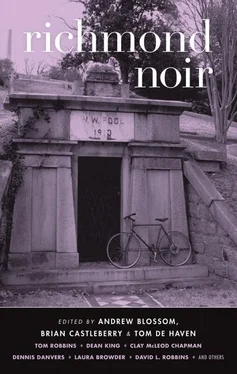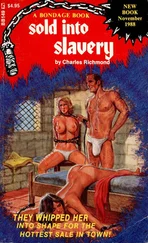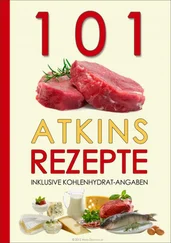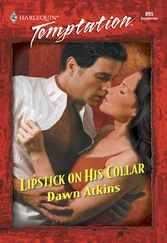X. Atkins - Richmond Noir
Здесь есть возможность читать онлайн «X. Atkins - Richmond Noir» весь текст электронной книги совершенно бесплатно (целиком полную версию без сокращений). В некоторых случаях можно слушать аудио, скачать через торрент в формате fb2 и присутствует краткое содержание. Город: New York, Год выпуска: 2010, ISBN: 2010, Издательство: Akashic Books, Жанр: Детектив, на английском языке. Описание произведения, (предисловие) а так же отзывы посетителей доступны на портале библиотеки ЛибКат.
- Название:Richmond Noir
- Автор:
- Издательство:Akashic Books
- Жанр:
- Год:2010
- Город:New York
- ISBN:978-1-933354-98-9
- Рейтинг книги:4 / 5. Голосов: 1
-
Избранное:Добавить в избранное
- Отзывы:
-
Ваша оценка:
- 80
- 1
- 2
- 3
- 4
- 5
Richmond Noir: краткое содержание, описание и аннотация
Предлагаем к чтению аннотацию, описание, краткое содержание или предисловие (зависит от того, что написал сам автор книги «Richmond Noir»). Если вы не нашли необходимую информацию о книге — напишите в комментариях, мы постараемся отыскать её.
Richmond Noir — читать онлайн бесплатно полную книгу (весь текст) целиком
Ниже представлен текст книги, разбитый по страницам. Система сохранения места последней прочитанной страницы, позволяет с удобством читать онлайн бесплатно книгу «Richmond Noir», без необходимости каждый раз заново искать на чём Вы остановились. Поставьте закладку, и сможете в любой момент перейти на страницу, на которой закончили чтение.
Интервал:
Закладка:
Jackson and I, we’d drunk plenty together, hung out. He’d gone to two of my weddings. But if he had one butt to hang out to dry, and it was mine or his... You get the picture.
I’d been covering the legislature for the last fifteen years. It was a sweet deal, with nobody really watching over me down at the Capitol. More was known than was ever reported. I always thought some of those country boys got themselves elected just so they could come to Richmond and party. And what was said and done at the parties, it was understood, stayed at the parties.
The new broom was being wielded by Hanford. Hanford the Hangman, they called him. Probably still do. He’s a forty-something ex-jarhead and seems to be under the mistaken belief that he stormed Iwo Jima. They’d brought him in from some place where grace is considered a liability. He’s the kind of stiff who’s necessary so the guys at the top, the real money, don’t have to get their hands dirty with firings and demotions and such. He’d been there a month when Jackson called me aside and told me, off the record, that Hanford had informed all the department heads that he wanted them to “work ’em till they drop.”
Maybe Hanford thought I was too old, although he put me on a beat that would wear even a young guy down. Maybe he’s prejudiced against smokers. Or so-called heavy drinkers.
Maybe it was because I flat out refused to slip into our former lieutenant governor’s hospital room and get a damn deathbed story from a poor sap who was dying of AIDS. Who can say?
At any rate, Jackson called me in to tell me there was a reorganization. Night cops. The night police beat.
“I do it to you,” he told me, not quite looking at me with those tired, bloodshot eyes, “or he does it to you, after he fires me.” I appreciated his honesty. And I figured Jackson would probably be gone before me. He made more money. Everybody around that sinking ship knew the bottom line. The publisher’s favorite saying was, “It is what it is,” code for, Shut up and keep rearranging those deck chairs...
So, it was a Friday night. We knew it was Pearl Harbor Day because, in a private e-mail sent to everyone who worked at the paper, from receptionists to pressmen, Hanford reamed out the poor night guy who’d failed to run a story on A1 to that effect.
Around 10:30 I heard, over the cop radio, turned up just loud enough so it didn’t disturb the copy desk watching an NBA game on one of the overhead TVs, that there’d been a shooting at 612 West Franklin.
I stopped playing solitaire on the computer.
“Isn’t that your...?” Sally Velez asked me from the metro desk.
“Yeah,” I said, and was on the elevator in about a minute.
612 West Franklin is the Prestwould, where I was living. It hovers over Monroe Park like a dark angel, casting its twelve-story shadow across the college kids and the homeless. They’d brought a guy down from New York City in the late ’20s to build it. Guess they had what you’d call delusions of grandeur. They finished it just in time for the Great Depression to punch in and end that kind of fairy-tale building. But it’s something. The sick puppy who had the unit across from mine, halfway up, said that if the 9/11 bastards had flown those planes into the Prestwould, they’d have just bounced off and killed a bunch of bums in the park.
The place has a lot of characters in it, but mostly of the midnight-and-magnolias Old Richmond type. The majority of them, to my knowledge, do not pack heat.
I was there in ten minutes. The night photo guy was out covering a fatality on the interstate, so I’d grabbed one of those moron cameras even reporters can use. They’d trained me how to use it the previous week. There wasn’t much crime-scene photography at the legislature, although maybe there should have been.
I saw Gillespie as soon as I got out of the beat-up company Citation and put out the Camel I wasn’t supposed to be smoking in it. He was leaning his fat butt against the patrol car. He’d been a young cop when I was on my first tour as police reporter, more than twenty-five years ago. He recognized me.
“Black,” he said. It wasn’t a greeting, just a confirmation. “I heard they kicked your ass back to the curb. You’ve put on weight.”
I mentioned that he seemed to have cornered the Krispy Kreme market.
He gave me the finger, but otherwise didn’t seem to take offense as we braced ourselves against the wind.
“What happened?” I looked up the side of the building. Most of the lights were out. The residents of the Prestwould were so used to sirens screaming by on Belvidere and Franklin that most of them wouldn’t know what had happened until morning. Only the twelfth floor, the Randolph unit, was lit.
“We got a call from the night security guy,” Gillespie said. “He got a call from some guy on eleven, saying he’d heard gunshots up above him.”
Nobody had really lived in that apartment since Taylor Randolph died in October. Far as anyone knew, her nephew, Mac Constantine, was her only living family, other than her sister Jordan, who the nephew had moved into an adult group home. Said it wouldn’t be safe for Aunt Jordie to be there by herself. He was a jerk, but maybe he was right. The nephew inherited the unit, and he stayed there sometimes. I’d been to one of his parties. I figured he would put it up for sale or just move in permanently, if he could afford to. The Randolphs were Commonwealth Club from way back, knew all the right people, but I knew Taylor had been hard-pressed to pay a four-figure condo fee, assessments, and seven grand a year in property taxes.
I’m renting, thank God.
When they went up, Gillespie and the other two cops, they found the door cracked. Inside, they found the nephew. It was a mess, Gillespie said, and when they let me up, I could see that the carpet looked like somebody had spilled a gallon of cheap Pinot Noir all over it. Pieces of indeterminate matter that probably used to be part of Mac Constantine’s brains speckled the rug and white walls. What was left of his head was, like the rest of him, under a sheet that was getting stained from beneath.
“You don’t wanna see,” Gillespie said before I even asked.
“So where...?”
“We figure the service elevator. Didn’t take the main one, or the guard would have seen him come out. Down there, up the stairs, out the back door. He must have took the gun with him.”
I walked through the rest of the unit. A lot of Taylor’s clothes were still in the closets. A half-empty bottle of Coke sat on the kitchen counter alongside the remains of a half-eaten pack of cheese Nabs.
I got the basics and was back at the paper in another twenty minutes, in time to get something in for the city edition. They even used one of the photos I took.
“Good job,” Sally Velez said to me. “You might have a future in this business.” I gave her the same one-finger salute Gillespie had given me.
I skipped the usual round or three at Penny Lane. Something was bothering me. It was like that piece of meat you realize is wedged between your molars after you’ve eaten a good steak. You know you can’t stop until you find a toothpick.
Next day, I took my morning stroll through the Fan. People were out walking their dogs, raking leaves, doing all the crap people do. Kate and I’d had a town house over near the river, and we’d spend Saturday mornings like that, more or less.
Kate was my most recent wife. She was the one who’d wanted to move to the Prestwould. Said she’d seen it all her life and always imagined what it would be like to live there. We’d only been married eight months when we stumbled on a rare rental unit and did the deed.
I’m not sure Kate understood what she was getting into, marrying me. What might have seemed at least regionally exotic — hearing my stories of state senators acting badly, going to cocktail parties where the governor called me by my first name (he knew the janitors’ first names too) — soon just became a pain in the ass. So did those long nights waiting for me. And then not waiting for me.
Читать дальшеИнтервал:
Закладка:
Похожие книги на «Richmond Noir»
Представляем Вашему вниманию похожие книги на «Richmond Noir» списком для выбора. Мы отобрали схожую по названию и смыслу литературу в надежде предоставить читателям больше вариантов отыскать новые, интересные, ещё непрочитанные произведения.
Обсуждение, отзывы о книге «Richmond Noir» и просто собственные мнения читателей. Оставьте ваши комментарии, напишите, что Вы думаете о произведении, его смысле или главных героях. Укажите что конкретно понравилось, а что нет, и почему Вы так считаете.












